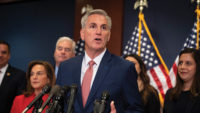As Congress returns to wrap up work for 2005, construction officials are watching the fate of several unfinished measures. They include a proposed shift of billions of dollars to rebuild the hurricane-battered Gulf Coast and an extension of the federal terrorism insurance program.
The White House proposed shifting $17.1 billion in approved but unspent Federal Emergency Management Agency funds to the Federal Highway Administration, Corps of Engineers and other agencies. Much of the money would go to repair roads and levees hit by Hurricane Katrina.
| Issues Still Pending on Capitol Hill: | |||
| Bill | Status | ||
|
2006 Appropriations | Construction concerned about possible across-the-board cut that would include infrastructure accounts. | ||
|
Hurricane Katrina Relief Aid | White House seeking to shift $17 billion in unspent funds from FEMA to FHWA, Corps, other infrastructure accounts. Senate Appropriations chairman seeking to add $17 billion more, mostly for block grants. | ||
|
Terrorism Insurance | Federal backstop coverage expires Dec. 31. Senate passed 2-year extension. House committee cleared bill continuing program for possible third year. | ||
| Water Resources | House passed measure authorizing Corps projects; Senate committee approved its version but no floor vote yet. Both bills estimated cost: $12 billion over 15 years. | ||
| Source: Congressional committees, Congressional Budget Office, industry officials, ENR | |||
Senate Appropriations Committee Chairman Thad Cochran (R-Miss.) wants to add about $17 billion to the White House package, including $11.5 billion for Community Development Block Grants and probably more funds for the Corps, says Cochran aide Jenny Manley. She says Cochran is likely to introduce a bill with the additional funding during the week of Dec. 12 but also is prepared to attach it to the 2006 defense spending bill
American Public Transportation Association President William Millar says its unconscionable that the White House plan didnt include transit funds. Were working with the Congress to try to correct that, he says.
Lawmakers also face a Dec. 31 cutoff of the federal terrorism coverage backstop. The Senate passed a two-year extension and the House set a Dec. 7 vote on its bill, which has room for a third year. House-Senate differences would have to be resolved. Were anxious to see that move, says Parsons Brinckerhoff Senior Vice President Cathy Connor.
There are fears that lawmakers will trim already approved 2006 budgets for construction and other domestic programs. The across-the-board spending cut has everybody concerned, says Steve Hall, an American Council of Engineering Companies vice president. A 2% cut was rumored. I think thats the starting point, Connor says. He believes any final cut would be below 2%.
A $12-billion Water Resources Development Act cleared the House, but the Senate version is stuck. Will the Senate pass a WRDA this month? Never say never, says National Waterways Conference President Worth Hager. But I think its looking more difficult.
| The states have used their own money for most of the post-Katrina repairs. The $40 million will help replenish their accounts. �These funds should give the states some financial relief while we wait for action on the next aid package,� says DOT Secretary Norman Mineta. The White House seeks $2.3 billion more for the region�s roads and bridges (see above). Louisiana�s estimated share would be $995 million, says state Transportation and Development Secretary Johnny B. Bradberry. Despite criticism of SAFETEA-LU�s thousands of projects, American Highway Users Alliance President Gregory Cohen says 91% of the statute�s total isn�t earmarked and most of the other 9% is for state �priorities.� Projects use Highway Trust Fund dollars, says Associated General Contractors CEO Stephen Sandherr. �This wasn�t a raid on the Treasury,� he says.
|



Post a comment to this article
Report Abusive Comment